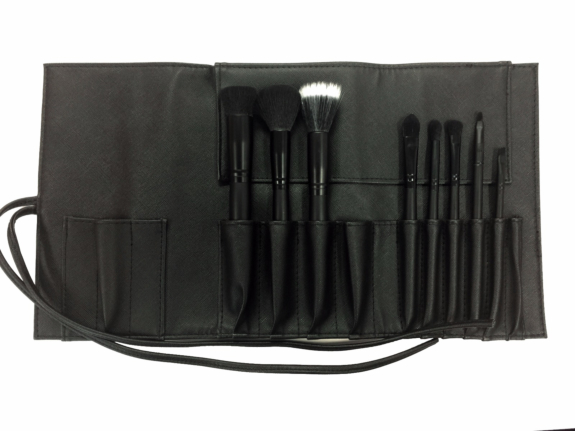 Beauty & Self Care
Beauty & Self Care  Nurture Yourself
Nurture Yourself
Should You Be Using Vegan Beauty Brushes?
Home » Nurture Yourself » Should You Be Using Vegan Beauty Brushes?
By Emma Stessman
Given the choice between a synthetic or natural product, your instinct would likely be to gravitate towards the latter. It makes sense, since the word “synthetic” is often associated with plastics and chemicals that don’t align with an eco-friendly lifestyle.
And when it comes to makeup brushes, the “natural” ones have long been considered to be the tools with the best results.
However, if you’re a vegan, you’re going to want to avoid them, since they’re generally made with animal hair, like from a badger or a boar, explains Celia Trevisani, the creative director of Australian beauty brand, INIKA Organic.
The good news?
Trevisani says that thanks to new synthetic technologies, cruelty-free options, like INIKA’s line of vegan brushes, can be better not only for our furry friends, but for your skin and getting the look you want. Here’s everything you need to know before making the switch.
The Benefits of Choosing a Vegan Brush
Obviously, if you’re a vegan, synthetic brushes are the best choice simply because they’re not made from animal hair. But according to Trevisani, the ethical benefits are just the beginning.
RELATED: What You Need to Know to Be A Healthy Vegan

Animal hair is extremely porous, she explains, so these brushes are prone to absorbing and retaining oil and bacteria. This is bad for your skin (for obvious reasons), but it can also make it harder to apply products with the brush. Vegan brushes, on the other hand, are hypoallergenic. “Vegan fibres are not as porous, so they stay smooth and sleek with repeated use and proper maintenance, and are less likely to allow bacteria to settle into the brush,” she says.
Natural brushes also tend to be coarser, which can irritate and damage the skin if used for too long––like when you’re applying multiple layers of makeup. With vegan brushes, the texture really depends on the brand. Some feel amazing, others are rough and too plasticy.
RELATED: 5 Surprising Natural Solutions to Common Skincare Issues
How to Care For Your Brushes
Okay, so if you do make the switch, the cleaning process for synthetic brushes isn’t too different from your run-of-the-mill natural brush. The most important factor is that you need to clean them. “Ideally, brushes need to be cleaned after every use,” Trevisani says. “But for us mere mortals, here’s a good rule of thumb; bi-weekly for foundation and base brushes and anything that touches the rim of the eye, and bi-monthly for eyeshadow and eyebrow brushes.”
Wet the bristles of the brush with warm water, Trevisani instructs, being careful not to get water on the ferrule (the metal connector) and the handle, as it can weaken the glue that holds the brush together. Massage a drop of organic baby shampoo through the bristles, then rinse thoroughly and dry on a flat surface.
The Brushes You Need
The brushes you need depend entirely on your makeup routine. So, if you’re someone who simply likes to swipe on a little powder before you head out for the day, you might only need to add a vegan powder brush to your arsenal. But if you’re someone who like to embrace the art of makeup on the daily, a full synthetic brush set may be the better option.
The good news is, many brushes that can play multiple roles in your makeup routine. For example, an eyeshadow blending brush, aside from its obvious purpose, can also be used to get precise in creating your perfect highlight and contour, Trevisani says. And a brush for eyeliner can also be used to darken your brow or to add some highlight to your inner eye and Cupid’s Bow.
Now, all you need are a few natural beauty products to match.
(Photos: Shutterstock; Inika Organic)
The Nutritious Life Editors are a team of healthy lifestyle enthusiasts who not only subscribe to — and live! — the 8 Pillars of a Nutritious Life, but also have access to some of the savviest thought leaders in the health and wellness space — including our founder and resident dietitian, Keri Glassman. From the hottest trends in wellness to the latest medical science, we stay on top of it all in order to deliver the info YOU need to live your most nutritious life.
DISCOVER MORE
RECENT ARTICLES

Want a sneak peek inside the program?
Get FREE access to some of the core training materials that make up our signature program – Become a Nutrition Coach.
Get Access"*" indicates required fields













































































































































































































































































































































































































































































































































































































































































































































































































































































































































































































































































































































































































































































































































































































































